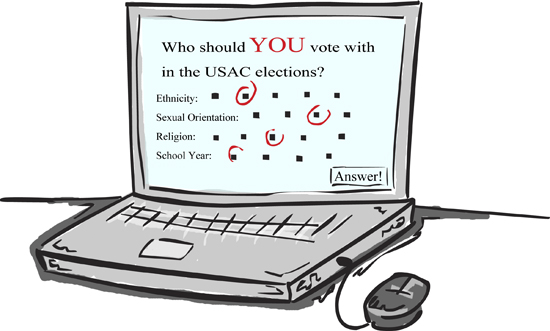Avoiding last week’s undergraduate student government election would have been a monumental task. Even if you managed to circumvent Bruin Walk in an effort to escape the campaigning, you may have been lucky enough ““ like I was ““ to receive a candidate knocking at your apartment’s front door.
The Facebook ads, fliering and giant wooden signs are overkill for an election that stirs more division in the UCLA community than unity. During this year’s USAC election, I felt more animosity between members of each slate than any overall sense of what needs to be done to make UCLA a better university.
The hype around the election became a minor annoyance as students on campus began wearing their party’s T-shirts and changing their Facebook profile pictures to demonstrate their support. I heard classmates discussing the candidates and who they were going to vote for or, in their more official terminology, affiliate themselves with.
One of my classmates even went so far as to suggest that I should have voted for Bruins United because I am “Caucasian.” This is when my indifference toward the election changed to full-scale infuriated.
There is no denying that I am white, but I do not feel obligated to vote for a particular slate because of my ethnicity.
This year, the election felt less about issues and more about social obligations to specific campus “cults.” Both slates ““ particularly Bruins United ““ used students’ associations with various campus organizations to draw support.
Last week, an advertisement on Facebook informed me that Christian students supported Bruins United. This type of campaigning asserts that if someone considers themselves to be a Christian student, they must also support Bruins United.
On the other hand, Students First! signs around campus represented different clubs that endorsed their party. Must a student vote for Students First! just because they are part of an on-campus LGBT organization?
This type of organizational association politics is not new, but it took precedence over issues in this year’s election. On Bruin Walk, I felt targeted because of the “type” of person I appear to be.
UCLA already has enough outlets for division. Many students feel a sense of urgency to join one of the interest-based clubs that pervade our campus.
These clubs can be the most meaningful part of one’s UCLA experience. On the other hand, students feel alienated from groups they are not involved in because of the tight-knit communities they foster.
Issues relevant to the USAC election are lost within these allegiances. One of the few slate-related issues discussed was the laughable Tipsy Taxi, a taxi service Bruins United wanted to initiate that would cost a flat rate of $3 for late nights in Westwood.
The only issue I heard an actual dialogue about was the PLEDGE referendum, which students across organizations took a vested interest in because of their own tight financial situations. However, this issue was not proposed by either slate. I did not hear even half as much discussion about slate initiatives compared with the debate surrounding PLEDGE.
The election should be about the collective generation of ideas for how our campus can improve, not about gaining unconditional support from different student organizations.
This politicking is alienating and runs contrary to UCLA’s commitment to diversity. Promoting diversity means encouraging students to step outside their comfort zones and learn about people from other walks of life. This election only demonstrated the disappointing way in which students bury themselves within familiar groups and bandwagon with the people they associate themselves with. It is not that the slates did not have valid initiatives, it’s that the discussion of these issues on campus fell flat during the week of the election.
On Thursday, Students First! won an overwhelming majority of the seats in the Undergraduate Students Association Council for the upcoming school year. Clearly, Bruins United’s aggressive campaign tactics ““ such as knocking on doors ““ were not effective. At such a large school, an easy way to garner support is to rely on association with different student groups. In the future, slates should make a concerted effort to move away from this and toward a real debate of important issues.
Students in USAC should strive not to play up these divisions, but to find common ground within the student body to change our university for the better. This may sound too idealistic, but if USAC isn’t remotely idealistic, no one else on campus will be.
Our student government should take on the challenge of the splintered campus and live up to the cheesy slogan of diversity that UCLA perpetuates. Hopefully, in spite of the overwhelming majority of a single slate in USAC, the council will seek to represent all students in the coming school year.
If you’re tired of divisive politics, then e-mail Mier at smier@media.ucla.edu.
